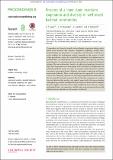Files in this item
Presence of a loner strain maintains cooperation and diversity in well-mixed bacterial communities
Item metadata
| dc.contributor.author | Inglis, Robert | |
| dc.contributor.author | Biernaskie, Jay | |
| dc.contributor.author | Gardner, Andy | |
| dc.contributor.author | Kümmerli, Rolf | |
| dc.date.accessioned | 2016-02-05T12:40:05Z | |
| dc.date.available | 2016-02-05T12:40:05Z | |
| dc.date.issued | 2016-01-13 | |
| dc.identifier | 236120074 | |
| dc.identifier | 3166a9d2-c253-4af4-9842-3bc123023e45 | |
| dc.identifier | 84955583092 | |
| dc.identifier | 000368441200028 | |
| dc.identifier.citation | Inglis , R , Biernaskie , J , Gardner , A & Kümmerli , R 2016 , ' Presence of a loner strain maintains cooperation and diversity in well-mixed bacterial communities ' , Proceedings of the Royal Society B: Biological Sciences , vol. 283 , no. 1822 . https://doi.org/10.1098/rspb.2015.2682 | en |
| dc.identifier.issn | 0962-8452 | |
| dc.identifier.uri | https://hdl.handle.net/10023/8142 | |
| dc.description.abstract | Cooperation and diversity abound in nature despite cooperators risking exploitation from defectors and superior competitors displacing weaker ones. Understanding the persistence of cooperation and diversity is therefore a major problem for evolutionary ecology, especially in the context of well-mixed populations, where the potential for exploitation and displacement is greatest. Here we demonstrate that a “loner effect”, described by economic game theorists, can maintain cooperation and diversity in real-world biological settings. We use mathematical models of public-good-producing bacteria to show that the presence of a loner strain, which produces an independent but relatively inefficient good, can lead to rock-paper-scissor dynamics, whereby cooperators outcompete loners, defectors outcompete cooperators, and loners outcompete defectors. These model predictions are supported by our observations of evolutionary dynamics in well-mixed experimental communities of the bacterium Pseudomonas aeruginosa. We find that the coexistence of cooperators and defectors, which respectively produce and exploit the iron-scavenging siderophore pyoverdine, is stabilized by the presence of loners with an independent iron-uptake mechanism. Our results establish the loner effect as a simple and general driver of cooperation and diversity in environments that 40 would otherwise favour defection and the erosion of diversity. | |
| dc.format.extent | 566058 | |
| dc.language.iso | eng | |
| dc.relation.ispartof | Proceedings of the Royal Society B: Biological Sciences | en |
| dc.subject | Experimental evolution | en |
| dc.subject | Microbial biodiversity | en |
| dc.subject | Non-transitive competition | en |
| dc.subject | Rock-paper-scissors dynamics | en |
| dc.subject | Siderophore | en |
| dc.subject | Social evolution | en |
| dc.subject | QR Microbiology | en |
| dc.subject | QH301 Biology | en |
| dc.subject | DAS | en |
| dc.subject.lcc | QR | en |
| dc.subject.lcc | QH301 | en |
| dc.title | Presence of a loner strain maintains cooperation and diversity in well-mixed bacterial communities | en |
| dc.type | Journal article | en |
| dc.contributor.sponsor | NERC | en |
| dc.contributor.institution | University of St Andrews. School of Biology | en |
| dc.contributor.institution | University of St Andrews. Centre for Biological Diversity | en |
| dc.identifier.doi | 10.1098/rspb.2015.2682 | |
| dc.description.status | Peer reviewed | en |
| dc.identifier.grantnumber | NE/K009524/1 | en |
This item appears in the following Collection(s)
Items in the St Andrews Research Repository are protected by copyright, with all rights reserved, unless otherwise indicated.

